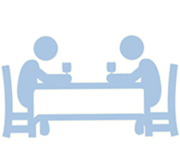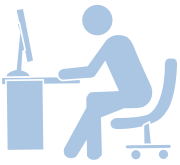






Although there will be changes in your life related to kidney disease and treatment, life will go on!
Many people, just like you, have learned how to live their lives around dialysis treatments. There are many resources, both professional and patient-sponsored, that can give you information and assistance in dealing with most of the issues that concern you.
You can still travel. You will need to plan ahead, but your clinic can assist you with making the arrangements to dialyse in other facilities while travelling. Patients on Peritoneal Dialysis often take their supplies with them for short trips. Even the cycler machine is portable.
For longer trips, supplies can be shipped to your destination.
There is no reason not to enjoy a meal out. Your dietitian can help you make good choices from restaurant menus.
Sexual difficulties can often occur amongst kidney patients, both men and women. Impotence, the inability of the male to have or maintain an erection, may occur. In women, the menstruation cycle may become irregular. There is no known single cause for these changes, but there are several physical and psychological factors that are thought to contribute to them. Stress and anxiety due to kidney disease and treatment may affect your sexual desire and ability to enjoy sex. Other factors that may influence your interests in sex include medication, diet, anaemia, inadequate dialysis and changes in hormonal balance.
Family dynamics often change when one family member has kidney disease. Concerns regarding sexuality are very common and are nothing to be embarrassed about. Please do not hesitate to talk openly to your doctor or nurse about these issues.
You can return to work while on dialysis. If you dialyse in a Hemodialysis centre, you will be given a treatment schedule that accommodates your schedule. Another alternative is Home Hemodialysis or Peritoneal Dialysis, which allow for more flexibility in schedules.
You can continue education while on dialysis. If you dialyse in a Hemodialysis centre, you will be given a treatment schedule that accommodates your education schedule. Another alternative is Home Hemodialysis or Peritoneal Dialysis, which allow for more flexibility in schedules.
You can return to many of the activities that you have enjoyed in the past. Getting enough exercise and keeping fit is important for everyone, including people with kidney disease. Your healthcare team can advise you of any precautions you need to take to protect your blood access site or Peritoneal Dialysis catheter.

You can still travel. You will need to plan ahead, but your clinic can assist you with making the arrangements to dialyse in other facilities while travelling. Patients on Peritoneal Dialysis often take their supplies with them for short trips. Even the cycler machine is portable.
For longer trips, supplies can be shipped to your destination.
There is no reason not to enjoy a meal out. Your dietitian can help you make good choices from restaurant menus.
Sexual difficulties can often occur amongst kidney patients, both men and women. Impotence, the inability of the male to have or maintain an erection, may occur. In women, the menstruation cycle may become irregular. There is no known single cause for these changes, but there are several physical and psychological factors that are thought to contribute to them. Stress and anxiety due to kidney disease and treatment may affect your sexual desire and ability to enjoy sex. Other factors that may influence your interests in sex include medication, diet, anaemia, inadequate dialysis and changes in hormonal balance.
Family dynamics often change when one family member has kidney disease. Concerns regarding sexuality are very common and are nothing to be embarrassed about. Please do not hesitate to talk openly to your doctor or nurse about these issues.
You can return to work or continue education while on dialysis. If you dialyse in a Haemodialysis centre, you will be given a treatment schedule that accommodates your work or education schedule. Another alternative is Home Haemodialysis or Peritoneal Dialysis, which allow for more flexibility in schedules.
You can return to work or continue education while on dialysis. If you dialyse in a Haemodialysis centre, you will be given a treatment schedule that accommodates your work or education schedule. Another alternative is Home Haemodialysis or Peritoneal Dialysis, which allow for more flexibility in schedules.
You can return to many of the activities that you have enjoyed in the past. Getting enough exercise and keeping fit is important for everyone, including people with kidney disease. Your healthcare team can advise you of any precautions you need to take to protect your blood access site or Peritoneal Dialysis catheter.
Although there will be changes in your life related to kidney disease and treatment, life will go on!
Many people, just like you, have learned how to live their lives around dialysis treatments. There are many resources, both professional and patient-sponsored, that can give you information and assistance in dealing with most of the issues that concern you.
